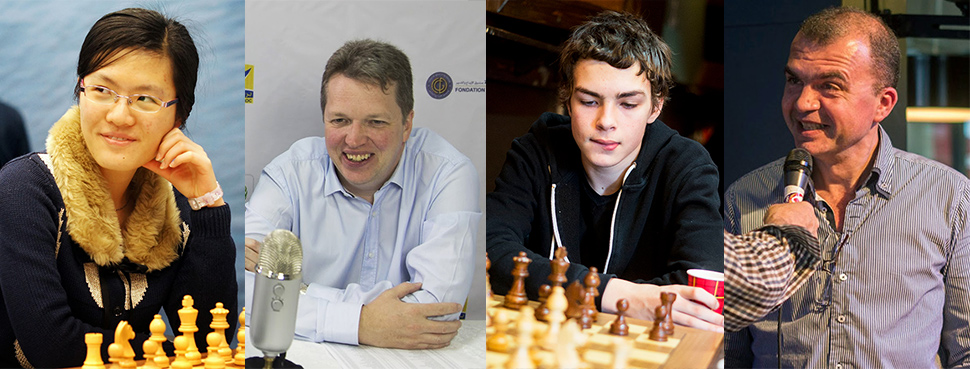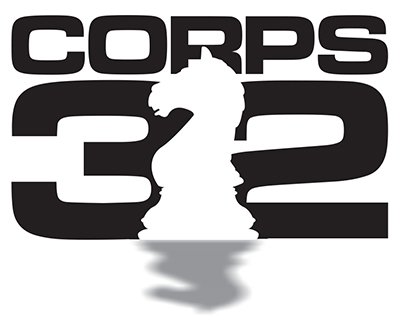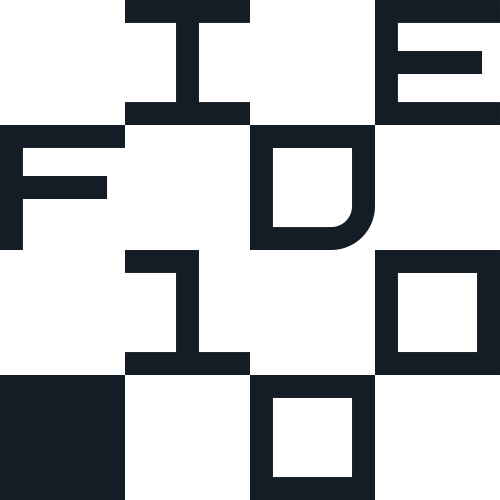Jorden van Foreest (30 April 1999)
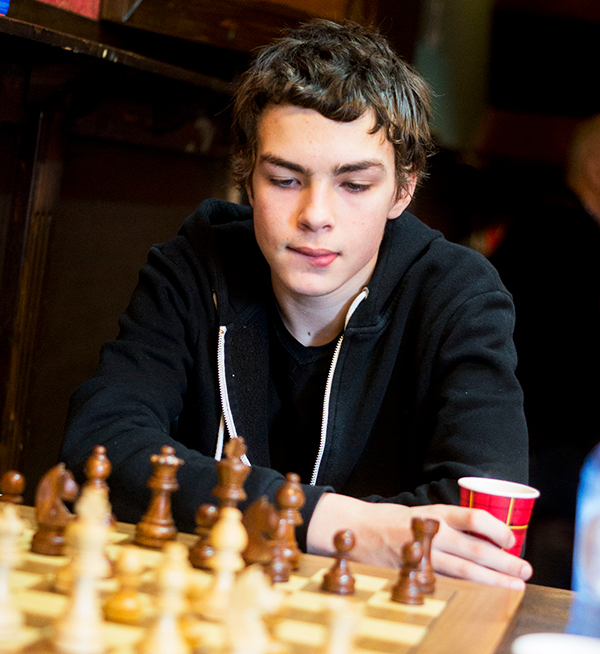 Things are going fast, as they should, with this young descendant of a famous Dutch chess family. Right before last year’s match with Jan Timman, Jorden van Foreest had earned the grandmaster title. In 2013 he was already U14 European Champion. The 2nd great-grandson of the former Dutch champions Dirk and Arnold van Foreest (both won the title three times – something which Jorden hasn’t achieved yet!) narrowly lost to the former world top player Timman. After that, he steeled his nerves in various events. In the Staufer Open he shared second place, he won the Groningen Open together with Sundar Shyam, and became Talent of the Year 2015 in his own province, Groningen. In the strong B-group of the Tata Steel tournament he ended at 50%, and in the equally strong Aeroflot Open he made it 5 out of 9. After that Jorden took an ‘altitude training’ by grandmaster Alexey Dreev with his coach Sergey Tiviakov. In May, he came shared second in the Limburg Open, and he won the national FischeRandom chess title. In June, he won the Utrecht Open. Jorden van Foreest is ready for the big ones!
Things are going fast, as they should, with this young descendant of a famous Dutch chess family. Right before last year’s match with Jan Timman, Jorden van Foreest had earned the grandmaster title. In 2013 he was already U14 European Champion. The 2nd great-grandson of the former Dutch champions Dirk and Arnold van Foreest (both won the title three times – something which Jorden hasn’t achieved yet!) narrowly lost to the former world top player Timman. After that, he steeled his nerves in various events. In the Staufer Open he shared second place, he won the Groningen Open together with Sundar Shyam, and became Talent of the Year 2015 in his own province, Groningen. In the strong B-group of the Tata Steel tournament he ended at 50%, and in the equally strong Aeroflot Open he made it 5 out of 9. After that Jorden took an ‘altitude training’ by grandmaster Alexey Dreev with his coach Sergey Tiviakov. In May, he came shared second in the Limburg Open, and he won the national FischeRandom chess title. In June, he won the Utrecht Open. Jorden van Foreest is ready for the big ones!
Ivan Sokolov (13 June 1968)
 One of those players who have settled in the Netherlands and have enormously enriched our chess life. Bosnian Ivan Sokolov became a grandmaster at 19, he was Yugoslavia champion in 1988, and came to our country in 1992. He became Dutch champion in 1995 and 1998, and in 2002 he officially became a Dutch citizen. Right after that, the Netherlands pronounced him chess player of the year (in 2003). With his exuberant chess and life style he is a favourite of the public. His victory over the then World Champion Garry Kasparov in the Hoogovens tournament 1999 was fantastic. In Hoogeveen, Sokolov has already two tournament victories to his name, in 2004 and 2008. In 2005 he was a member of the Dutch team that became European champion.
One of those players who have settled in the Netherlands and have enormously enriched our chess life. Bosnian Ivan Sokolov became a grandmaster at 19, he was Yugoslavia champion in 1988, and came to our country in 1992. He became Dutch champion in 1995 and 1998, and in 2002 he officially became a Dutch citizen. Right after that, the Netherlands pronounced him chess player of the year (in 2003). With his exuberant chess and life style he is a favourite of the public. His victory over the then World Champion Garry Kasparov in the Hoogovens tournament 1999 was fantastic. In Hoogeveen, Sokolov has already two tournament victories to his name, in 2004 and 2008. In 2005 he was a member of the Dutch team that became European champion.
Sokolov has written several highly acclaimed chess books. In his latest book, Ivan’s Chess Journey, he describes his experiences behind the board and elsewhere, quite humoristic and not exactly sparing himself. On the 64 squares he is still a tough opponent, and in his match with Jorden van Foreest we may expect some spectacular chess.
Hou Yifan (27 February 1994)
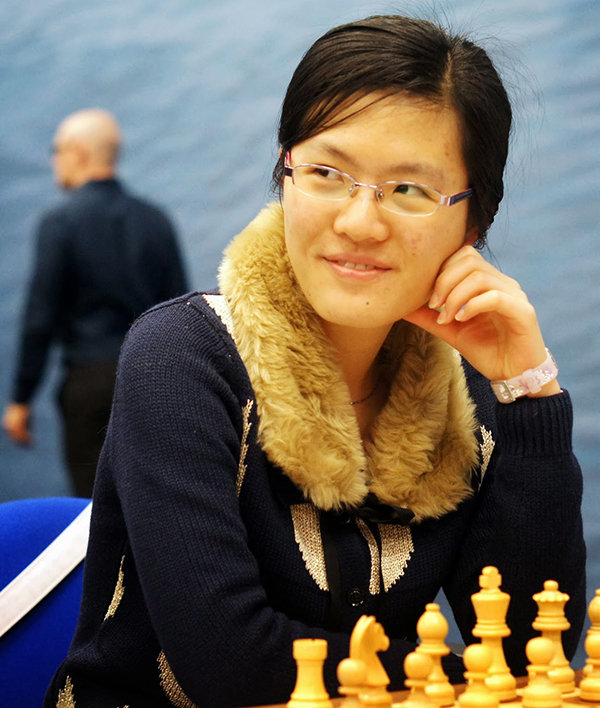 Hou Yifan has a special connection with the Netherlands. At twelve, she already scored 7 out of 13 in the C-groep of the Corus tournament (2007). After that she played four more times in Wijk aan Zee – twice in the Masters group. At 8 she was already U10 Girls World Champion, and in December 2010 she became the youngest ever World Champion by winning a match against her compatriot Ruan Lufei. In women’s chess she has been the undisputable number one ever since, but just like her illustrious predecessor, Judit Polgar, she has also amply proved she can hold her own against top-level men as well. In 2011, Hou Yifan successfully defended her title against Humpy Koneru; in 2013 she convincingly beat Anna Ushenina in a match. In 2015 she decided not to defend her title in the FIDE knock-out tournament. That event was won by Maria Muzychuk, who had no chance in a match versus Hou Yifan this year. In 2012, the Chinese shared first place in the Gibraltar Masters with Nigel Short, her opponent in Hoogeveen this year. In 2015 the Englishman wrote an article about women’s chess in New In Chess, which was nuanced but still caused quite a stir. Although woman chess players have become stronger, they still aren’t as good at it as the men, Short claimed. If there is anyone who can belie this today, it is Hou Yifan. Which was also what Short wrote in the same article...
Hou Yifan has a special connection with the Netherlands. At twelve, she already scored 7 out of 13 in the C-groep of the Corus tournament (2007). After that she played four more times in Wijk aan Zee – twice in the Masters group. At 8 she was already U10 Girls World Champion, and in December 2010 she became the youngest ever World Champion by winning a match against her compatriot Ruan Lufei. In women’s chess she has been the undisputable number one ever since, but just like her illustrious predecessor, Judit Polgar, she has also amply proved she can hold her own against top-level men as well. In 2011, Hou Yifan successfully defended her title against Humpy Koneru; in 2013 she convincingly beat Anna Ushenina in a match. In 2015 she decided not to defend her title in the FIDE knock-out tournament. That event was won by Maria Muzychuk, who had no chance in a match versus Hou Yifan this year. In 2012, the Chinese shared first place in the Gibraltar Masters with Nigel Short, her opponent in Hoogeveen this year. In 2015 the Englishman wrote an article about women’s chess in New In Chess, which was nuanced but still caused quite a stir. Although woman chess players have become stronger, they still aren’t as good at it as the men, Short claimed. If there is anyone who can belie this today, it is Hou Yifan. Which was also what Short wrote in the same article...
Nigel Short (1 June 1965)
 Nigel Short is the oldest Wunderkind in this company. In 1984, he became a grandmaster – the youngest in the world at the time. He is an extremely active chess player who travels all around the world, winning countless tournaments. Antarctica is the last continent where he has no tournament to his name yet! Short already took part in the Candidates Matches for the World Championship in 1988, but in 1991 and 1992 the Englishman was really on a roll. He defeated the man who was thought to be unbeatable, Anatoly Karpov, in a match, and then he did the same to our champion Jan Timman. After some quarreling with FIDE about the organization of the World Championship match against Garry Kasparov, both players founded the PCA. In London 1993, Short lost the match 7½-12½, but it wasn’t as one-sided as this score seems to suggest. Short carried on playing tournaments (in the Essent tournament in Hoogeveen, 2004, he came second with 3 out of 6), travelling and promoting chess. On that subject he has been writing engaging and often provoking articles in the magazine New In Chess for several years. Even though he wrote in one of those articles that women are less good at chess than men, he knows very well that Hou Yifan won’t be an easy prey for him.
Nigel Short is the oldest Wunderkind in this company. In 1984, he became a grandmaster – the youngest in the world at the time. He is an extremely active chess player who travels all around the world, winning countless tournaments. Antarctica is the last continent where he has no tournament to his name yet! Short already took part in the Candidates Matches for the World Championship in 1988, but in 1991 and 1992 the Englishman was really on a roll. He defeated the man who was thought to be unbeatable, Anatoly Karpov, in a match, and then he did the same to our champion Jan Timman. After some quarreling with FIDE about the organization of the World Championship match against Garry Kasparov, both players founded the PCA. In London 1993, Short lost the match 7½-12½, but it wasn’t as one-sided as this score seems to suggest. Short carried on playing tournaments (in the Essent tournament in Hoogeveen, 2004, he came second with 3 out of 6), travelling and promoting chess. On that subject he has been writing engaging and often provoking articles in the magazine New In Chess for several years. Even though he wrote in one of those articles that women are less good at chess than men, he knows very well that Hou Yifan won’t be an easy prey for him.

 .
. 
